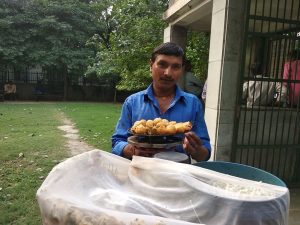People of Bharat: Bikram Lal, Delhi

I am wandering near Azadpur area, North-East Delhi. The stinging odours of summer had been replaced with soft, refreshing smells of wet mud and fresh growth all around me. As dark clouds gather overhead, the cooler breeze sets the heart starts craving for pakodas (deep fried lentil fritters), I spot a man selling these on the side of the road. He heats them up for me on a tiny stove on his cart after fetching them out of a basket covered with a clean white cloth. After I dig into a plate of pakodas, my cravings satisfied, I linger around to ask a few questions…
Bikram Lal, 30, has been frying and selling pakodas for the past 16 to 17 years. He is a petite man with an uncharacteristic but neat haircut. Clean shaven, he is dressed in a shirt and a pair of jeans. A native of Faizabad village of Ayodhya district in Uttar Pradesh, Bikram was the youngest of seven siblings and doesn’t remember ever going to school. His parents were engaged in agricultural work and owned their own land.
Bikram followed his elder brother to Delhi as a teenager, after his parents passed away almost 15 years ago. Initially, he learnt the trade while working with his brother and then set up his own. Bikram got married 12 years ago and brought his wife to live with him in the city. They have four children — two sons and two daughters.
Bikram lives in a rented house with his wife and children. The house has a total of three rooms that are shared by twelve people which includes Bikram’s family. He tells me they are people from his village; like him, they also work in the city. The house is equipped only with fans,lights and utensils. He does not have a gas connection/cylinder in his name but buys one every month fromthe black market for cooking purposes. ‘I have more things in the village — bicycle, cart, tractor…’ he says enumerating his belongings. He rears a young kid, a buffalo and a small calf back home which he bought for Rs. 3000, Rs. 30,000 and Rs. 12,000 respectively. He also owns a few chickens. He has also bought a small plot of land in the village for Rs. 20,000. In his absence, his cousins look after his ancestral land — they farm it and take care of the animals. He does not own any gold.
Bikram starts his day at 5 AM. He and his wife fry pakodas while his older children help with cutting up green chillies and onions for the pakodas, and its chutney (an accompaniment or dip made with ground spices). After a quick bite and a bath, he gets dressed and leaves for work at around 11. He frequents the same spot and sells pakodas till 10 or 11 PM — or as he tells me — till his stock gets exhausted. Then he heads back home. ‘Agar saare bik gaye toh faydaa hai, varna nuksaan hai mera’ (I am in profit only if everything gets sold off) explains Bikram. Bikram sells 10 small pakodas for Rs. 5 and spends Rs. 400 on raw materials (lentils) per month not accounting for the onions and green chillies. His daily earnings range from Rs. 200–400 depending on the way business has been. Somedays he makes less and somedays he makes more. He changes his quantity of raw materials to suit the demand in pakodas.
Bikram Lal makes anywhere from between Rs. 12,000–15,000 selling pakodas. His household spends Rs. 5–7000 on groceries and Rs. 3500 on monthly rent. At the end of each month, Bikram is able to save Rs. 1–2000 but that amount varies. Three of Bikram’s children go to government school; his youngest goes to a private school for which the fees amount to Rs. 4–5000 a year. He owns a smartphone which his children use to surf the internet or play games.
He refrains from any kind of monetary transaction online. Bikram and his wife own bank accounts; he uses his account for savings. He uses a friend’s account in the village to send money home to his cousins as none of them owns a bank account. Bikram has a BPL ration card registered to his family’s name in the village. His cousins use it to get subsidized rations. Last year, his eldest brother’s daughter got married. Bikram gifted the couple a new scooter which he bought for Rs. 75,000 from his own savings.
Bikram decided to invest in life insurance with LIC about ten years ago. He handed money over to an agent who would give him a receipt for it. After about five years, the agent started falling back on giving him a receipt, claiming that Bikram had defaulted on a couple of hundred rupees while making payment. ‘We always counted the money before giving it to him’ emphasises Bikram. After being accused of this a couple of more times, Bikram grew suspicious and stopped making payments. When he tried to withdraw the money at LIC’s office, he was informed there was nothing under his name. The shrill calls of hawks circling above us inspire mental images of metaphorical ones who hunt and exploit people like Bikram. ‘Hamare saath baimani kiya usne. Loota humko’ (He cheated us. Robbed us) says Bikram, now twice shy.
Bikram has no plans of expanding his business or trying out something else for a living. He strikes me as risk averse but he has good reason, ‘Padehe likhe to hain nai. Koi naukri kar li toh bhi saat-aath, hazar se jyaada nahi milega’ (I am uneducated. Even if I did a job for a regular salary no one would give me more than 7 or 8 thousand rupees). He has no financial worries and aspires to get his children educated. He also harbours another wish and that is to own a house someday. ‘Socha toh hai ghar ka. Do ladke hai mere; ho jayega lagta hai’ (I have thought about a house. I have two sons; perhaps I can pull it off).
I feel Bikram is placing unreasonable faith in his sons but his children is all the guarantee he has for the future.
This research was developed as part of the Bharat Inclusion Initiative.
